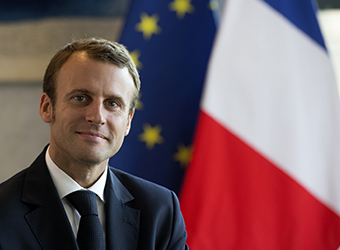French voters went back to the polls on Sunday for the first round of parliamentary elections that are predicted to give President Emmanuel Macron’s centrist party a commanding majority.
Macron has enjoyed a political honeymoon since he beat far-right candidate Marine Le Pen to become France’s youngest-ever president on May 7, naming a cabinet that straddles the left-right divide and making assured appearances in meetings with US President Donald Trump and Russian President Vladimir Putin.
But the 39-year-old president has done only half the job. His Republique en Marche (Republic on the Move, REM) party, which he founded only 14 months ago, needs a clear majority in the National Assembly for him to push through the reforms he promised in his campaign.
A host of opinion polls show that Macron’s untested party could take 30 percent of the first-round vote, putting it on track to secure a landslide in next Sunday’s second round.
The centre-right Republicans and the Socialists fear heavy losses after their candidates failed to reach the presidential run-off for the first time in France’s postwar history.
Some predictions indicate the REM could win around 400 seats in the 577-seat chamber thanks to voters seeking to give the new president a strong mandate.
The party is already leading in 10 of the 11 French overseas constituencies, which held their first-round vote last weekend.
On Sunday, Macron, after shaking hands and posing for selfies with well-wishers, cast his ballot in the northern resort of Le Touquet where he and his 64-year-old wife Brigitte have a home.
Few MPs are expected to be elected in the first round.
If no candidate wins over 50 percent, the two top-placed contenders go into the second round — as does any candidate who garners at least 12.5 percent of registered voters.
Polling stations in the largest cities are open until 8:00 pm (1800 GMT) with exit polls released immediately afterwards.
At midday, turnout among the some 47 million eligible voters was 19.24 percent, down from 21.06 percent at the same point in the 2012 legislative elections.
More than 50,000 police were on patrol in a country still jittery after a wave of Islamist militant attacks that have killed more than 230 people since 2015.
In the latest incident, a 40-year-old self-radicalised Algerian was shot and wounded after he attacked a policeman with a hammer outside Paris’s Notre Dame cathedral on Tuesday.
The REM has named many candidates who have never held office in an attempt to bring new blood to French politics.
They include Marie Sara, a retired bullfighter, who is taking on Gilbert Collard, a senior member of Le Pen’s National Front in southern France.
The Socialists’ demise could come into sharp focus if its leader Jean-Christophe Cambadelis, 65, is ousted from his Paris seat by REM junior minister Mounir Mahjoubi, who is just 33.
Macron is also trying to usher in an era of “cleaner” politics, banning lawmakers from employing family members or performing consultancy work while in office.
The measures follow the scandal that destroyed the presidential bid of Republicans candidate Francois Fillon, who has been charged over paying his wife Penelope and two of their children more than 900,000 euros ($1 million) as his parliamentary assistants with little work to show for it.
Two parties, Le Pen’s National Front and the small centrist MoDem party, an REM ally, are under investigation over alleged expenses fraud at the European Parliament.
One of Macron’s ministers, Richard Ferrand, is also being probed over a property deal involving his wife.
Le Pen’s party, meanwhile, looks set to struggle to win the 15 seats it would need to form a parliamentary group, a result that would be another deep disappointment after her defeat by Macron.
But Le Pen told AFP this week in the northern town of Henin-Beaumont where she is bidding to win a seat that with other parties likely to agree to work with Macron, “we will be the only opposition force.”
The radical-left France Insoumise (France Unbowed) party of Jean-Luc Melenchon is also hoping to perform strongly and inflict more pain on the Socialists.
Macron has urged voters to back his reform proposals including an overhaul of the rigid rules governing the job market, blamed by many economists for holding back growth.
The president was economy minister in the Socialist government that began implementing the reforms last year, sparking mass demonstrations that lasted for months.
Source: AFP


